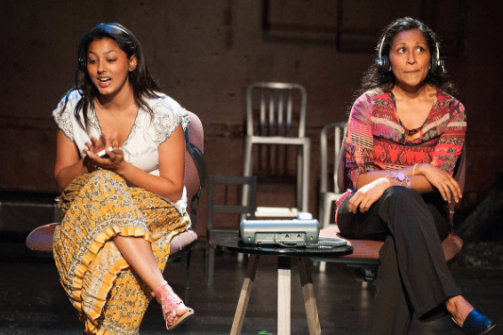I Like To Be Here: Jackson Heights Revisited, Or, This Is A Mango
By Jenny Lyn Bader, J. Stephen Brantley, Ed Cardona Jr., Les Hunter, Tom Miller, Melisa Tien, and Joy Tomasko
Conceived and Directed By Ari Laura Kreith
Produced by New Ohio Theatre and Theatre 167
Off Broadway, New Play
Runs through 9.27.14
New Ohio Theatre, 154 Christopher Street
by Jerron Herman on 9.19.14
 Lipica Shah and Indika Senanayake in I Like To Be Here. Photo by Joel Weber.
Lipica Shah and Indika Senanayake in I Like To Be Here. Photo by Joel Weber.
BOTTOM LINE: Theatre 167 recreates this diverse Queens neighborhood with equal parts of intrigue and power.
I have a hard time with Queens: it’s often hard to navigate, its trains aren’t the most reliable, and it has actual houses, which often makes me envious; you can imagine how I might feel transporting to the “outer” borough via theater. Actually, I was relieved: the community conscious theater company Theatre 167 creates an accessible tale of a multi-ethnic environment bridging tense gaps between its multilingual inhabitants. A tough feat, a worthwhile night of theater nevertheless.
A well-acted ensemble piece, the play outlines the many voices that inhabit the Queens neighborhood of Jackson Heights: Indian, Mexican, Dominican, Puerto Rican, Irish, and so on. It’s then deepened by the particular voices within: policemen, junkies, transvestites, cabbies, and honest fathers; this is a particularly strong piece that examines “grey area” or that which cannot be labeled “good” or “bad.” Taking the incoherent junkie (played expertly by ensemble member J. Stephen Brantley) as an example, we are made aware of his intelligence within his drug abuse: is his sharp wit informed by the drugs or is it the other way around? Then there’s the gay Latino son whose father disapproves of any man who isn’t Oscar De La Hoya, setting an impossible standard, but also dismantling the trite father-gay son relationship.
There are funny storylines like the two Indian operators who share the mystery of an unknown admirer; or pause-worthy relationships like the Mexican store clerk and the Colombian sex worker who are both locked inside her house. This particular bond seems to center the ensemble milieu, especially in the final exhilarating moments. The actors’ strength of storytelling is at times the play’s champion and also its disservice.
An ensemble piece of this magnitude might be difficult for early theater-goers. The beauty of this ensemble work is the layered ethnic voices, but this production double casts the actors, so the particular character names can get lost. This is compounded by the fact that the program provides little additional information. However, this is not to slight the wonderful, and incredibly diverse, twenty-one person cast. In a post-racial America (though how "post" is still up for debate), it seems disconcerting that I can't distinguish between the characters "Devaj" and "Salim." Ironically, the only actor I can definitively pair with all the characters he played is Brantley, who played a junkie and an ex-cop with amazing distinction. Yet in some way I am delighted that the "White Guy" becomes the sore thumb: the person who sticks out because he's different from everyone else. Needless to say, the cast is powerful: they all contribute with their own emphasis and it is truly thrilling to lose sight of who’s who and just absorb the room.
I Like To Be Here is politically charged at moments and might be perfect for advocates of the gentrification discussion or of cultural appropriation in general. Or, if you are not so political, this piece will certainly inform you about the diversity of Jackson Heights. And the play encapsulates “diversity” with a capital D. If you are asking yourself, “where is someone like me in today’s theater?” then take the time to (re)visit the Jackson Heights of I Like To Be Here. Whether Latino, Indian, gay, young, or other, you are represented. At the end of the play the cast shares a strong focus, all sharing their point of view in the same moment, and its here the play moves from abstract to reality. The audience can leave not knowing everything, but certainly a bigger chunk about Jackson Heights. It’s a play that’s set strongly in a particular place, but that place is altogether appetizing, and therefore worthwhile.
(I Like To Be Here: Jackson Heights Revisited, or, This is a Mango plays at the New Ohio Theatre, 154 Christopher Street, through September 27, 2014. Performances are Sundays at 2PM and 7PM, and Wednesdays through Saturdays at 8PM. There is no performance on Saturday, September 20. Tickets are $18 and $16 for students and seniors, and can be purchased online at www.theatre167.org or by calling 866.811.4111.)

